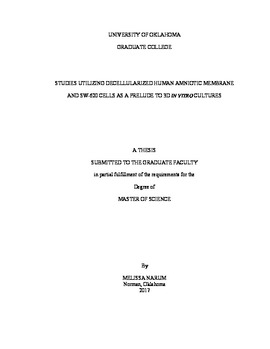| dc.contributor.advisor | Sikavitsas, Vassilios | |
| dc.contributor.author | Narum, Melissa | |
| dc.date.accessioned | 2017-08-10T15:46:06Z | |
| dc.date.available | 2017-08-10T15:46:06Z | |
| dc.date.issued | 2017 | |
| dc.identifier.uri | https://hdl.handle.net/11244/51900 | |
| dc.description.abstract | The prevalence of cancer in modern society has increased from 14.1 million new diagnoses and 8.2 million deaths in 2012 to an estimated 21.7 million new diagnoses and 13 million cancer-related deaths projected in 2030. The development of novel methods for 3D in vitro tumor growth can help to understand better the progression of the disease and eventually provide new therapeutic approaches, especially at the personalized medicine level. Human amniotic membrane is a promising biological scaffold for the growth of cancer cells and ultimately tumorigenesis. The membrane is antimicrobial and contains important extracellular matrix components for cancer cell growth. SW-620 colon cancer cells were seeded on the surface of the decellularized human amniotic membrane in the presented studies. SW-620 colon cancer cells were shown to proliferate on decellularized amniotic membrane in a shortened seeding and culturing two day procedure. A five day seeding and culturing on the decellularized membrane procedure resulted in a three day proliferative period (days 0 through 3) with a 60% seeding efficiency on day 0 (555,000 initially seeded cells). The number of cells plateaued from days 3 to 5. These results provide a promising proof-of-concept in 3D in vitro monolayer culture. Future work is necessary to improve the use of human amniotic membrane as a 3D in vitro scaffold through layering or surface modifications. Comparison of the genotypic expression between the in vivo, 3D in vitro amniotic membrane and 2D culture models using PCR is also necessary to determine if the cells are behaving like cells in physiological conditions. | en_US |
| dc.language | en_US | en_US |
| dc.subject | In vitro culture model | en_US |
| dc.subject | colon cancer | en_US |
| dc.title | STUDIES UTILIZING DECELLULARIZED HUMAN AMNIOTIC MEMBRANE AND SW-620 CELLS AS A PRELUDE TO 3D IN VITRO CULTURES | en_US |
| dc.contributor.committeeMember | O'Rear, Edgar | |
| dc.contributor.committeeMember | Harrison, Roger | |
| dc.date.manuscript | 2017-07-24 | |
| dc.thesis.degree | Master of Science | en_US |
| ou.group | College of Engineering::Stephenson School of Biomedical Engineering | en_US |
